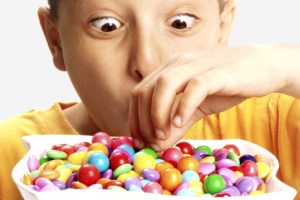DR. JIM PALERMO: Six-Pack of Space Coast Daily Health and Medical Headlines
By Dr. James Palermo // August 18, 2016
health benefits of coffee dependent on genes

Topics Include: Sugar For The Kids May Be Getting A Bad Rap; Flossing May Be Overrated; ‘Older’ Olympians Shine In Rio – and More.
DOES SUGAR MAKE KIDS HYPER?
Is there any science behind the notion that if a child slugs down a sugary beverage or devours a bag of M&Ms a burst of hyperactivity will ensue?
 According to recent research as reported in Live Science, the answer is NO.
According to recent research as reported in Live Science, the answer is NO.
While some parents may swear that the answer is “yes,” Dr. Mark Wolraich, chief of Developmental and Behavioral Pediatrics at Oklahoma University Health Sciences Center, who researched sugar’s effect on children in the 1990s, says, “Sugar does not appear to affect behavior in children.” (Laurel Geggel, Live Science, 08/15/16)
LITTLE PROOF FLOSSING REALLY HELPS
Forgot to floss? Well, that’s not necessarily a bad thing since it turns out that there is apparently no evidence that flossing helps.
 Even though the American Dental Association insists on its website that, “Flossing is an essential part of taking care of your teeth and gums,” when the federal government issued its latest dietary guidelines this year, the flossing recommendation had been removed, without notice. In a letter to the AP, the government acknowledged the effectiveness of flossing had never been researched, as required.
Even though the American Dental Association insists on its website that, “Flossing is an essential part of taking care of your teeth and gums,” when the federal government issued its latest dietary guidelines this year, the flossing recommendation had been removed, without notice. In a letter to the AP, the government acknowledged the effectiveness of flossing had never been researched, as required.
“The majority of available studies fail to demonstrate that flossing is generally effective in plaque removal,” said one review of research related to flossing conducted last year. Another 2015 review cites ” inconsistent/weak evidence” for flossing and a “lack of efficacy.” (AP/Detroit Free Press, 08/03/16)
SCHMACON, A BEEF-BASED BACON ALTERNATIVE
Love the taste of bacon but not the fat and calories — or the various turkey-based alternatives? How about Schmacon?
 Schmacon, a beef-based bacon alternative, which, according to its creator Howard Bender, the owner of Schmaltz Deli in Naperville, Illinois, has about half the calories and half the fat of pork bacon, and tastes great.
Schmacon, a beef-based bacon alternative, which, according to its creator Howard Bender, the owner of Schmaltz Deli in Naperville, Illinois, has about half the calories and half the fat of pork bacon, and tastes great.
The product appeals to not only those who want a healthier version of bacon but those who simply want the taste of bacon without breaking the religious dietary laws of Islam and Judaism. (Fox News, 07/28/16)
FOR COFFEE DRINKERS, THE BUZZ MAY BE IN YOUR GENES
The science on the harm or benefit of coffee is all over the map.
 Why is there so much conflicting evidence about coffee?
Why is there so much conflicting evidence about coffee?
Recently reported research out of the National Institute of Health suggests that coffee’s goodness or badness may be in your genes and related directly to fast and slow caffeine metabolizers. (Anahad O’Connor, New York Times, 07/12/16)
THE U.S. MATERNAL DEATH RATE HAS DOUBLED DUE TO PREEXISTING CONDITIONS
More women die from pregnancy-related causes in the United States than in every other developed nation—and the U.S. maternal mortality rate is increasing over time.
According to Center for Disease Control and Prevention (CDC) data, the rate of pregnancy-related deaths in the United States has more than doubled between 1987 and 2012—increasing from 7.2 to 15.9 deaths per 100,000 live births.
 Thirty years ago, women died in the delivery room because of hemorrhages and pregnancy-induced blood pressure spikes. Now they are much more likely to die because of preexisting chronic conditions like obesity, heart disease or diabetes.
Thirty years ago, women died in the delivery room because of hemorrhages and pregnancy-induced blood pressure spikes. Now they are much more likely to die because of preexisting chronic conditions like obesity, heart disease or diabetes.
William Callaghan, chief of maternal and infant health at CDC, explained that the patient population in the United States is growing more complex, which is contributing to more maternal deaths.
“It’s a larger problem than just dealing with women during pregnancy, it’s the health of our society,” said Callaghan. “Imagine a [pregnant] woman comes in with [a body mass index] of 40, and she’s 24 years old—that didn’t happen in the past year, it happened in the past 24 years.” (Sarah Frostenson, Vox, 08/08/16)
OLYMPIC ATHLETES PROVE OLDER DOESN’T HAVE TO MEAN SLOWER
This week in Rio, Cyclist Kristin Armstrong became the first American woman to win the gold medal three times in the same event, and at age 43, the oldest female Olympic cycling champion.
 Armstrong is one of many athletes saying that high-level sports aren’t just for the young, and scientists say exercise reduces aging’s toll for us all.
Armstrong is one of many athletes saying that high-level sports aren’t just for the young, and scientists say exercise reduces aging’s toll for us all.
NPR reports on “older” Olympic athletes who have proven that the impact of aging on performance is not necessarily detrimental, and with customized training combined with the experience that accompanies aging, may even enhance performance in some sports. (Rae Ellen Beshell, NPR, 08/16/16)














